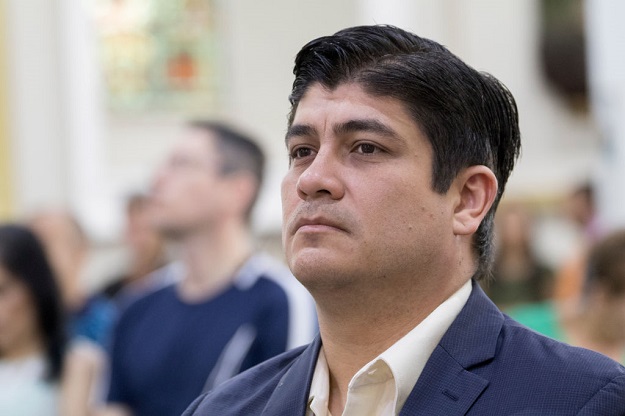In the first battle of Latin America’s “Year of Elections,” the center unexpectedly held.
After a campaign that was shaken first by a government corruption scandal, and then by a bitter debate over same-sex marriage and the future of the secular state itself, Costa Ricans ended up choosing a fairly ordinary, center-left ruling party candidate on Sunday as their next president.
Carlos Alvarado Quesada won by a much bigger margin than expected, 60 percent to 40 percent, over Christian singer and journalist Fabricio Alvarado Muñoz. The outcome was the result of skilled alliance building by the victor, and some unique aspects of Costa Rican politics. Nevertheless, it will hearten observers worried about rising extremist, anti-democratic sentiment elsewhere in Latin America, where two in three citizens will elect a new president before 2018 is over.
“It was a vote of confidence in democracy and in institutions,” Giancarlo Morelli, a Costa Rican political analyst at the Economist Intelligence Unit, told AQ. “For Latin America, it shows that democracy can carry on.”
Throughout the campaign, challenger Alvarado Muñoz showed little interest in participating in debates, and his efforts to mobilize evangelical communities around his campaign drew a warning from Costa Rica’s chief electoral body. That the candidate found himself having to clarify that he supported the separation of church and state reflected his emphasis on social issues like gay rights and abortion. Alvarado Muñoz’s promises to pull Costa Rica out of the Inter-American Court of Human Rights after a ruling on same-sex marriage he disagreed with drew concerns over the candidate’s reverence for institutions.
Other strongly anti-establishment candidates have soared in polls across a region where support for democracy fell to just 53 percent in 2017, according to Latinobarómetro.
In Costa Rica, pre-election polls had showed the two candidates tied. While the 38-year-old’s win was decisive, it required the support of voters from outside his party. Morelli said Alvarado Quesada now has a “strong mandate” to include these voices in his new administration, critical to his government’s ability to stave off a looming fiscal crisis and unify the country.
Sending that message may help heal some national wounds after a campaign many say exposed fractions within Costa Rican society.
“Costa Rica isn’t a homogenous country. Different sectors have different interests,” said Maria Jose Cascante, deputy director of the University of Costa Rica’s Center for Research and Political Studies. “Carlos was better at recognizing these differences and was able to draw support from traditional political parties and from social movements.”
How well the new president incorporates these groups’ interests into his new administration may determine whether he and his Citizen’s Action Party can navigate Costa Rica’s unicameral National Assembly as the third largest force. Although its candidate lost the runoff, Alvarado Muñoz’s evangelical National Restoration party won the second-most seats in the incoming Congress in February’s first round vote, with 14 out of 57. The centrist National Liberation party has the most, with 17.
“It’s a complicated combination,” said Cascante of Alvarado Quesada’s challenge of getting his agenda through a Congress where seven parties are represented. “Having to negotiate with an assembly with a strong conservative and evangelical contingent is a challenge for any president.”
There are signs, however, that Alvarado Quesada will do the bridge-building needed to tackle not just Costa Rica’s growing fiscal deficit but also its deteriorating infrastructure and lingering inequality. Ahead of the runoff, Alvarado Quesada entered into an alliance with former candidate Rodolfo Piza and Piza’s Social Christian Unity Party, adopting many of Piza’s policy proposals into his platform.
“He needs to follow that program, and he must name people from other parties as ministers and to key institutions in the government,” Morelli told AQ, citing Piza’s probable inclusion in Alvarado’s government as a minister. “The fiscal reform can not wait any longer, so these alliances have to happen.”
—
O’Boyle is an editor for AQ.









